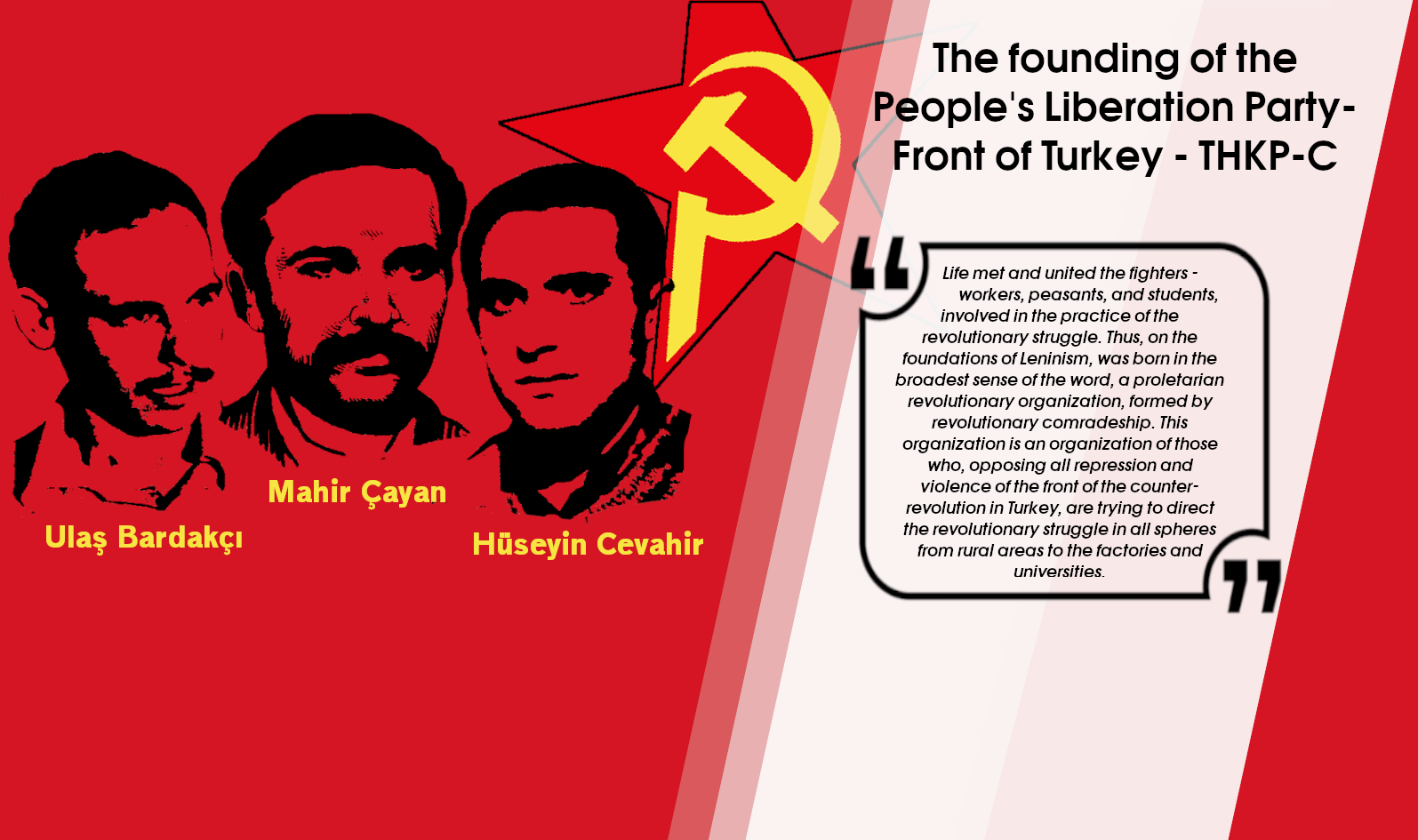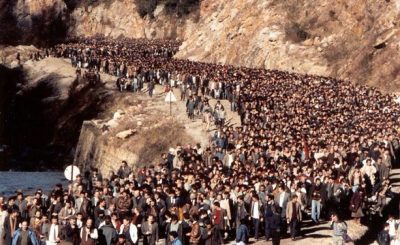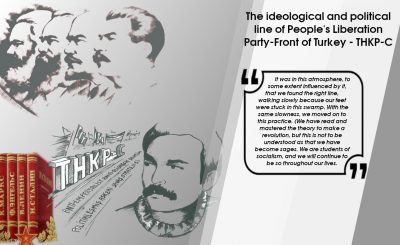Turkey in the early 1970s… This is a period during which the struggle started by the university youth against imperialism and its lackeys, attracts more and more working-class people. This is a period in which the spontaneous protests of the workers erupt one after another. During this period, along with major labor struggles such as the protests of June 15-16, 1970[1], smaller and larger strikes, occupations of factories, street clashes broke between workers on the one side and the police, gendarmerie, and army on the other, the peasants occupied the land of landlords and hold rallies expressing their demands. Along with them, the university youth held anti-imperialist rallies, as well as occupations and boycotts of classes, to demand and defend student and democratic rights. During this period, the oligarchy slowly and gradually revealed its fascist character.
The oligarchy brutally attacked even the smallest actions of the peoples’ masses demanding rights and freedoms, those who wanted independence, those who opposed exploitation were thrown in prisons. To instill fear among university youth, police attack universities occupy them and carry out mass killings. The poor Kurdish people was being subjected to state terror under the pretext of “seizing illegal weapons” and others.
Marxist-Leninist, revolutionary leader Mahir Çayan[2] and his comrades stated that in this period in which the actions arising spontaneously, and the dissatisfaction of the masses against the status quo have increased, the masses can’t fight for political power through a youth organization. such as the Federation of Revolutionary Youth (known as DEV-GENÇ in short)[3], and the creation of a Marxist-Leninist party is needed. In a pamphlet published during this period by Mahir Çayan and his comrades entitled “The Revolutionary Struggle in Turkey in the Period 1965-1971 and the Federation of Revolutionary Youth,” they set out their views as follows:
“During this period, in which the ruling classes openly resort to the use of force, and the revisionist cliques make fierce pacifist propaganda, it is necessary for the cadres we have to be involved in an organized manner in the most active struggle possible.
It is necessary to respond to the repressions of the counter-revolution, with revolutionary violence, by showing the masses of workers and peasants the need for active struggle. It is necessary, without waiting with stoic patience, to enter into the active struggle, and in the course of this struggle to organize the broadest masses of the people. Only through such a struggle will the swamps of revisionism on the path to socialism be dried up, and the people of Turkey will achieve their freedom. “
At the 5th Congress of the Federation of Revolutionary Youth, held on October 17-18, 1970, Mahir Çayan was the first to speak and deliver a long speech. In it, he stated that the strategy for the National Democratic Revolution (in Turkish Milli Demokratik Devrim) is a strategy for waging war, and the tasks of such a revolutionary war cannot be accomplished by a youth organization such as the Federation of Revolutionary Youth, this can be done only by creating the organizational structure of a Party.
This congress of the Federation of Revolutionary Youth had brought to the surface the ideological differences between Mihri Belli[4] and Mahir Çayan and his comrades, who had until then participated together in the theoretical socialist magazine Enlightenment (Aydınlık Sosyalist Dergi). Following this congress on October 29-30, of the same year, the cadres who would later found THKP-C held a meeting at the Scene of Unity Theater in Ankara, hoping to create an atmosphere open to criticism and self-criticism, and that in this way the movement would take a more correct course, they decided to criticize Mihri Belli for the right-wing course followed by him, since the time he participated in the circle around the Turkish Left magazine (Türk Solu dergisi).
Mihri Belli, who believed that the Revolutionary Movement is represented by his personality, considered the criticisms directed at him as personal attacks, and under the influence of this bad temper, he openly exposed all his opportunist and revisionist theses, which he had not uttered before openly, and preferred to disguise.
After this meeting, Mahir Çayan and his comrades decided that it was high time to break away from the circle around the socialist magazine Enlightenment. In the pamphlet “Open Letter to the Socialist Magazine Enlightenment”, they stated why they break away from the circle, stating one by one the reasons that led to this event, and in it, they set out all their thoughts on the separation from this political circle. (This pamphlet was published in January 1971 by Kurtuluş/ Liberation / Publishing House, founded by Mahir Çayan and his comrades).
The cadres, most of whom formed as such in the course of the struggle waged by the Federation of Revolutionary Youth, whose ideological and political views became clear during this period, in December 1970, founded the People’s Liberation Party-Front of Turkey (Türkiye Halk Kurtuluş Partisi-Cephesi; THKP-C), as an expression of secession from the 50 years of the tradition of the traditional leftist movement, and as a political and military organization that will intensify the war against the oligarchy.
In issue 1 of the newspaper Kurtuluş / Liberation /, dated March 15, 1971, which is the ideological and political organ of the Party, reads as follows:
“Life met and united the fighters – workers, peasants, and students, involved in the practice of the revolutionary struggle. Thus, on the foundations of Leninism, was born in the broadest sense of the word, a proletarian revolutionary organization, formed by revolutionary comradeship. This organization is an organization of those who, opposing all repression and violence of the front of the counter-revolution in Turkey, are trying to direct the revolutionary struggle in all spheres from rural areas to the factories and universities. “
Although most of the cadres who formed THKP-C are originating from the ranks of Federation of Revolutionary Youth, they not limited themselves to the struggle for educational and democratic rights of the youth, during this period they also advocated for the demands of workers, peasants, and civil servants, and all groups of the people. As a natural result, they have developed very good relations with all groups of people. These connections were strengthened over time by becoming the organizational structures of THKP-C.
Source: Karataş, Dursun. On the road to victory(Zafer Yolunda), Boran Yayınları, Istanbul, 2000. pp. 63-64.
Footnotes:
1- This refers to the massive workers’ protests and the uprising of June 15-16, 1970, which covered Istanbul and the region. You can read more about this event in this article:
https://newsolution.fi/two-days-in-which-history-was-written-june-15-16-1970/
2- Marxist-Leninist, revolutionary, one of the founders of THKP-C and its leader until his martyrdom in 1972. He made a very important contribution to the theory of the communist movement in Turkey. His biography can be read at this address:
https://newsolution.fi/mahir-cayan-biography/
3- Revolutionary Youth, also known by the short name in Turkish – Dev-Genç, is a Marxist-Leninist youth organization in Turkey, having its origins in “Clubs for Ideas” found in various universities in the country in the second half of the 1950s (in Turkish Fikir Külüperi), which in the mid-1960s were unified into the Federation of Idea Clubs (Fikir Külüperi Federasyonu). It was during this period that the Marxist-Leninists, led by Mahir Çayan, succeeded in imposing a militant course on the organization as a turning point in the process of shaping Dev-Genç as a Marxist-Leninist organization uniting the youth with the October 1969 congress is a turning point in this process, and marks the date since it took the name by which it is known to this day.
4- Mihri Belli was a Turkish communist who became acquainted with the ideas of Marxism while he was a student in the United States in the 1930s. Upon his return to Turkey, he established ties with the Communist Party of Turkey (TKP), which was operating illegally at the time. During the same period, he developed academic activity in Istanbul. In 1946 he left Turkey, and joined the civil war in Greece, on the side of the Communists. Here he shows the good abilities of a fighter and a military commander. He was wounded twice during the battles and was treated in Bulgaria and the USSR. He was repeatedly arrested and imprisoned for his articles in various socialist newspapers and magazines. He lived for many years in exile in Europe because of the repressions he was subjected to. He died in 2011, at the age of 95, at his home in Istanbul. He remains in the history of the communist movement in Turkey, devoting his whole life to the struggle for socialism.



